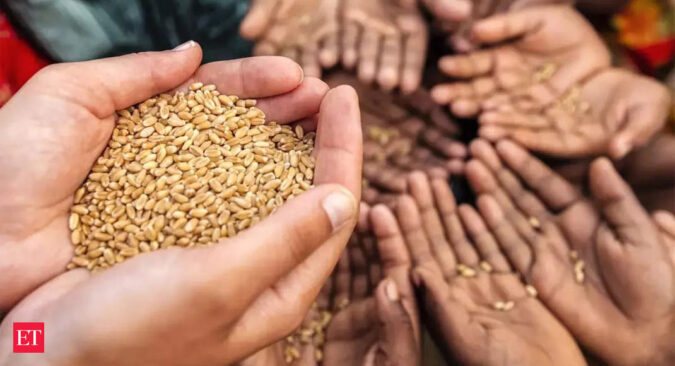He also mentioned that the government procurement of fresh wheat crop has kick-started, and about 10,727 tonne was purchased at minimum support price (MSP) in Madhya Pradesh on Monday.
India, the world’s second-largest wheat producer, banned wheat exports in May 2022, with immediate effect as part of measures to control rising domestic prices.
“As far as the government is concerned for ensuring the food security of the common man, no export of wheat will be allowed. So, the export ban on wheat will continue as long as the country does not feel comfortable with supplies,” Meena told reporters.
Estimated higher wheat production this year will ensure sufficient supplies for both government procurement and general consumption in the Indian market, he said.
The government has projected a record wheat production of 112.18 million tonne in the 2023-24 crop year (July-June), as per the second estimate of the agriculture ministry.
Meena said the agriculture ministry has estimated a record wheat output, taking into account weather fluctuations. “Rains are a cause of concern as it affects the quality of the grain. The accompanying factor of rain is that the temperature comes down. Low temperature is good for wheat crops for full maturity. Therefore, the estimated quantity of wheat production is likely to be achieved,” he said.
As a result, the government’s wheat procurement target of 34.15 million tonne will also be achieved, he added.
Stating that the FCI has started the wheat procurement operation, Meena said about 10,727 tonne of wheat was procured in Madhya Pradesh on March 27.
“The first arrival has started in MP. About 10,727 tonne was procured, though there was huge arrival of 5.56 lakh tonne on Monday,” he said.
Procurement on the same date in the year-ago period was nil. The arrivals were huge due to the harvesting of short-duration crops this year.
Procurement centres across the country will remain open. Procurement in Punjab and Haryana will begin from April 1 onwards.
FCI aims to procure 13.2 million tonne of wheat from Punjab, 7.5 million tonne from Haryana and 8 million tonne from Madhya Pradesh in the 2023-24 marketing year (April-March), he added.
Asked if quality norms will be relaxed for the rain-hit wheat crop, Meena said, “A team will be sent to assess the condition if required. We will take a call based on the report submitted by the team”.
The government is confident that the estimated record production will be achieved and the target of procurement will be achieved this year, he asserted.
Sharing about the sale of wheat from the buffer stock under the open market sale scheme (OMSS) to check rising wheat and wheat flour prices, Meena said this has been stopped for now as the prices have stabilised.
The quantity of wheat sold in the market has led to (mandi) prices coming down from Rs 30 per kg in the last week of January to Rs 22-23 per kg now. The prices will further come down on improved supplies from the harvesting of new crops, he said.
About 33.78 lakh tonne of wheat was sold under the OMSS to bulk consumers like wheat flour millers at a discounted rate. About 10,000 tonne were sold to Tamil Nadu, while 60,000 tonne to cooperative Nafed, NCCF and Kendriya Bhandar.
Meena said 32.10 lakh tonne of wheat has already been lifted so far, the balance quantity will be lifted before this month-end.
On April 1, FCI godowns would have a wheat stock of 84 lakh tonne.
Last year, wheat procurement for the central pool declined to 187.92 lakh tonne from 433.44 lakh tonne in the 2021-22 marketing year due to a fall in production in view of heatwaves in some states.
FCI is the government’s nodal agency that undertakes the procurement and distribution of food grains for the PDS and welfare schemes.
